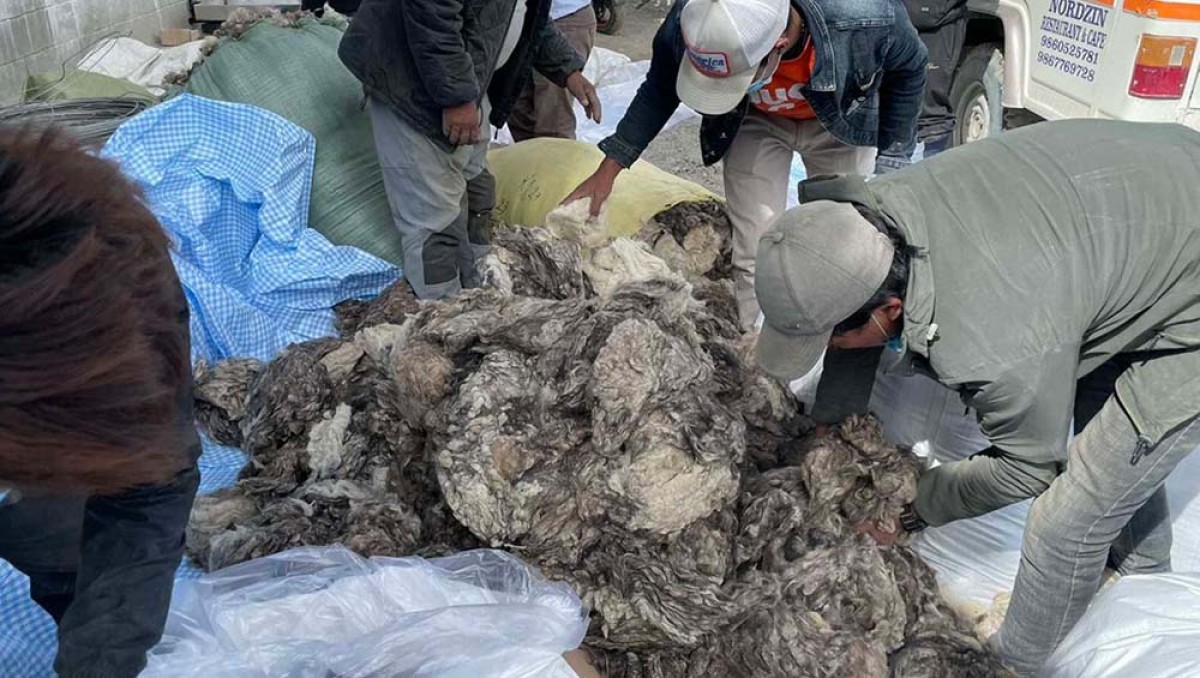

Farmers of Mustang are overjoyed after the fleece (wool) falling from Yak’s body was assured to get to the market. After the Nepali pashmina industrialists set up an eyebrow collection center in Charang of Damodarkund Loghekar village of Mustang, it has been ensured that wool will find a market. It is expected that the wasted cannabis wool will be put to good use, farmers will get income and help in replacing the import of pashmina’s raw material.
The Nepal Pashmina Industries Association has set up an eyebrow collection center in Charang to produce pashmina yarn by processing indigenous raw material (wool). Chairman of the association Dhan Prasad Lamichhane informed that the yarn is being produced by processing local wool as an alternative to the raw materials brought from Mongolia and China.
“We have opened a Nepal Fiber Processing Industry in Kathmandu to process indigenous wool,” he said.
A team of Utsav Khanal, Biju Shakya, Bhim Sherchan and Engineer Vivekananda Mishra led by Lamichhane returned to Kathmandu on Tuesday after interacting with Damodarkund Loghekar and people’s representatives of Lomanthang village and Changrapalak farmers. The association has sent a representative to Manang to study the feasibility of thye wool and will immediately visit Dolpa, Mugu and Humla districts.
Nepal exports pashmina worth Rs 3 billion annually and imports 195 tons of pashmina yarn annually. Engineer Mishra, who is also a pashmina industrialist, said that if Mustang’s wool could be processed, the import of thread could be reduced by 30 percent.
Farmers of Mustang do not extract wool due to lack of market certainty. There was a problem of not getting market even after collecting 30 percent wool. During the International Trade Fair at Korla Naka on the Tibetan border, Chinese traders used to take wool with them.
Due to Corona, millions of rupees worth of wool could not be sold in the last two years due to lack of trade fair. Tassie Bisht of Lomanthang expressed happiness over the fair price and market for the wasted wool. Preparations are underway to set up another collection center in Lomanthang to market wool to farmers. An agreement has been reached to collect the wool brought by the farmers to the center and then take it to Kathmandu.
According to the association, unprocessed wool will be procured at an average price of Rs 4,500 per kg. The month of Vaishakh-Jeth is the yam for removing wool from Yak’s body. The skin and manure of Himali Changra, famous for its meat, is also sold. Khanal, a pashmina industrialist, said that in order to increase the number of cannabis, grass cultivation, storage, vaccination should be done to manage the food in winter.
Yak wool is a (A) class raw material for pashmina. Changra wool is considered to be of better quality than sheep and goats. Farmers of Muktinath, Kagbeni, Chhusang, Jomsom, Chaile, Ghami, Charang, Lomanthang and other places of Mustang have engaged in commercial cultivation.
Meanwhile, farmers in Upper Mustang have complained that they have been deprived of the facilities of the Nepal Livestock Sector Innovation Project (NLSIP), which is being run with the help of the World Bank to make Nepal self-sufficient in meat and milk. Pasang Bista, a farmer in Charang, said that the procedure should be amended to include the farmers in the Himalayan region.